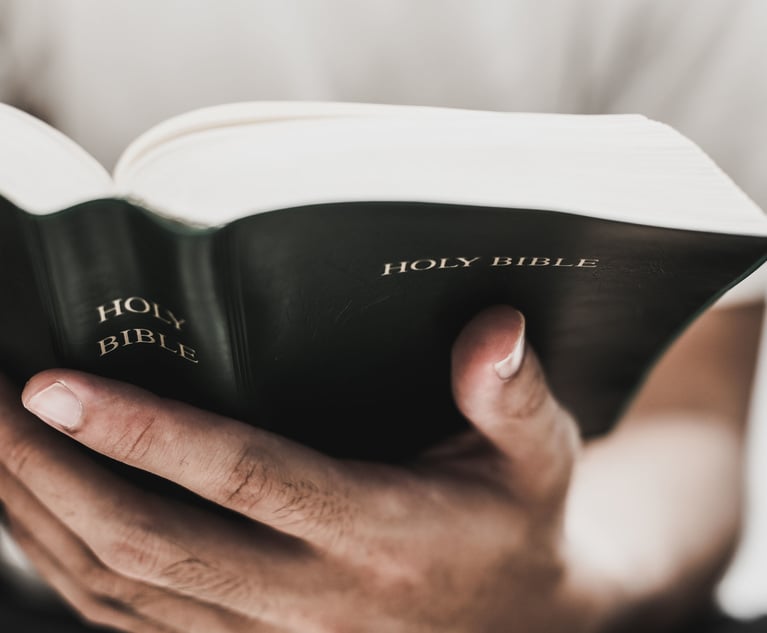Change in Athletes' Endorsement Law Eyed
Money-making opportunities have become a part of the calculus that athletes consider when choosing schools.
September 22, 2022 at 11:01 AM
5 minute read
 Credit: Melinda Nagy/Shutterstock.com.
Credit: Melinda Nagy/Shutterstock.com. More than a year after a Florida law began allowing college athletes to make endorsement money, some athletics officials say a key piece of the law needs a second look to preserve schools' recruiting advantages.
The law and similar laws in other states came after long-running debates about whether athletes should be able to profit from their names, images and likenesses after being blocked from cashing in while college sports became increasingly lucrative.
The Legislature in 2020 passed what's commonly known as the name, image and likeness, or NIL, law, with the measure taking effect in July 2021.
Athletes can sign endorsement contracts and get help from agents, while Florida colleges and universities are barred from interfering with the opportunities to cash in.
What followed passage of the Florida law nationally was a "patchwork" of state NIL laws, as NCAA President Mark Emmert described it when he testified before Congress last year. And people involved in athletics say Florida is somewhat of an outlier in preventing schools from helping athletes secure deals.
"A postsecondary educational institution, an entity whose purpose includes supporting or benefitting the institution or its athletic programs, or an officer, director, or employee of such institution or entity may not compensate or cause compensation to be directed to a current or prospective intercollegiate athlete for her or his name, image, or likeness," the law says.
The issue drew attention this month during a meeting of the Seminole Boosters, the fundraising arm of Florida State University's athletics program. Several FSU head coaches, a senior associate athletics director and the boosters' CEO participated in a panel discussion.
Leonard Hamilton, who has coached FSU's basketball team since 2002, described a seismic change that name, image and likeness laws have brought.
"The whole landscape of college athletics has changed," Hamilton said during the Sept. 8 event. "And it's at a whole 'nother level with what we're competing against out there."
Money-making opportunities have become a part of the calculus that athletes consider when choosing schools. Hamilton said the part of the Florida law preventing schools from helping athletes secure deals has coaches tiptoeing around NIL discussions on the recruiting trail.
"From our standpoint, it's been challenging," Hamilton said. "From a state of Florida standpoint, some things we can't say. In the state of Florida, I'm not really able to go out and talk to kids about NIL."
Hamilton said coaches in other states "can just flat out have conversations" about athletes' NIL opportunities.
Jim Curry, Florida State's senior associate athletics director, gave the crowd gathered in the Dunlap Champions Club inside FSU's football stadium a breakdown of how the Florida law placed restrictions on universities.
"When we look at … the Florida law, it mostly regulates what's happening at the institutional level. So, it really kind of took the institution and positioned it arm's length in both directions; can't restrict or deny opportunities, but at the same time can't direct or cause compensation. So as Coach Hamilton mentioned, it really kind of positioned our coaches and our staff in a place where they can't create opportunities for student athletes," Curry said.
Seminole Boosters President and CEO Stephen Ponder floated potential tweaks to the law that could allow schools to get closer to the process.
The Seminole Boosters, Ponder said, aren't allowed to be "arm-in-arm" with what are called "collectives" — an emerging force in the NIL world. Collectives are entities that, for instance, allow fans and, in some cases, wealthy supporters of universities to pull together money that funds athletes' NIL opportunities.
For example, the Gator Collective, which supports University of Florida athletes, allows fans to donate $10 a month "to pay Gator student-athletes to provide fans with exclusive content."
Ponder expressed interest in lawmakers narrowing the gap between collectives and university boosters.
"I'm hoping in Florida, over the next couple of months, and when we get into session next year from a legislative standpoint, that we are in a different place relative to the state law that allows us to be more involved in it. Because it is not going away," Ponder said.
Senate Majority Leader Debbie Mayfield, an Indialantic Republican who was a sponsor of the NIL legislation, said lawmakers' focus "all along has been protecting the athletes and to give the athletes the ability to earn money while they are at the peak of their career."
The part of the law carving universities out of the process, Mayfield said, was "one of the things that the universities wanted us to put in there."
But as discussions about the evolving NIL landscape play out, Mayfield said she is not opposed to the possibility of considering changes that would allow colleges and universities to get closer to the process.
"Again, the devil's in the details of what that looks like. But if it's something that will benefit and help the athlete, I would not be opposed to looking at it," Mayfield said in an interview with The News Service of Florida. "One of the advantages we will have now is looking at what the other states have done and what the effects of that have been on the athletes."
NOT FOR REPRINT
© 2025 ALM Global, LLC, All Rights Reserved. Request academic re-use from www.copyright.com. All other uses, submit a request to [email protected]. For more information visit Asset & Logo Licensing.
You Might Like
View All
'I've Seen Terrible Things': Lawyer Predicts Spike in Hazing Suits

How Florida Supreme Court Changes Affect Firms: AI Concerns at Forefront

11th Circuit Rejects Private School's Religious Rights Claim When Stopped From Broadcasting Public Prayer

Trending Stories
- 1Crypto Hacker’s $65 Million Scam Ends in Indictment
- 2Trump's Inspectors General Purge Could Make Policy Changes Easier, Observers Say
- 3Supporting Our Supreme Court Justices in the Guardianship Part
- 4'Erroneous Rulings'?: Wilmer Asks 4th Circuit to Overturn Mosby's Criminal Convictions
- 5Judge Orders Acquittal of Ex-Prosecutor on 1 of 2 Counts in Misconduct Trial Over Ahmaud Arbery Case
Who Got The Work
J. Brugh Lower of Gibbons has entered an appearance for industrial equipment supplier Devco Corporation in a pending trademark infringement lawsuit. The suit, accusing the defendant of selling knock-off Graco products, was filed Dec. 18 in New Jersey District Court by Rivkin Radler on behalf of Graco Inc. and Graco Minnesota. The case, assigned to U.S. District Judge Zahid N. Quraishi, is 3:24-cv-11294, Graco Inc. et al v. Devco Corporation.
Who Got The Work
Rebecca Maller-Stein and Kent A. Yalowitz of Arnold & Porter Kaye Scholer have entered their appearances for Hanaco Venture Capital and its executives, Lior Prosor and David Frankel, in a pending securities lawsuit. The action, filed on Dec. 24 in New York Southern District Court by Zell, Aron & Co. on behalf of Goldeneye Advisors, accuses the defendants of negligently and fraudulently managing the plaintiff's $1 million investment. The case, assigned to U.S. District Judge Vernon S. Broderick, is 1:24-cv-09918, Goldeneye Advisors, LLC v. Hanaco Venture Capital, Ltd. et al.
Who Got The Work
Attorneys from A&O Shearman has stepped in as defense counsel for Toronto-Dominion Bank and other defendants in a pending securities class action. The suit, filed Dec. 11 in New York Southern District Court by Bleichmar Fonti & Auld, accuses the defendants of concealing the bank's 'pervasive' deficiencies in regards to its compliance with the Bank Secrecy Act and the quality of its anti-money laundering controls. The case, assigned to U.S. District Judge Arun Subramanian, is 1:24-cv-09445, Gonzalez v. The Toronto-Dominion Bank et al.
Who Got The Work
Crown Castle International, a Pennsylvania company providing shared communications infrastructure, has turned to Luke D. Wolf of Gordon Rees Scully Mansukhani to fend off a pending breach-of-contract lawsuit. The court action, filed Nov. 25 in Michigan Eastern District Court by Hooper Hathaway PC on behalf of The Town Residences LLC, accuses Crown Castle of failing to transfer approximately $30,000 in utility payments from T-Mobile in breach of a roof-top lease and assignment agreement. The case, assigned to U.S. District Judge Susan K. Declercq, is 2:24-cv-13131, The Town Residences LLC v. T-Mobile US, Inc. et al.
Who Got The Work
Wilfred P. Coronato and Daniel M. Schwartz of McCarter & English have stepped in as defense counsel to Electrolux Home Products Inc. in a pending product liability lawsuit. The court action, filed Nov. 26 in New York Eastern District Court by Poulos Lopiccolo PC and Nagel Rice LLP on behalf of David Stern, alleges that the defendant's refrigerators’ drawers and shelving repeatedly break and fall apart within months after purchase. The case, assigned to U.S. District Judge Joan M. Azrack, is 2:24-cv-08204, Stern v. Electrolux Home Products, Inc.
Featured Firms
Law Offices of Gary Martin Hays & Associates, P.C.
(470) 294-1674
Law Offices of Mark E. Salomone
(857) 444-6468
Smith & Hassler
(713) 739-1250






